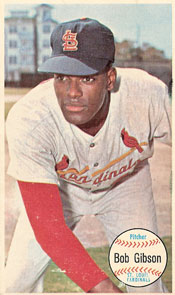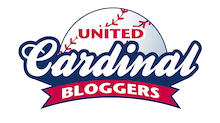(Updated April 4, 2019)
Devastated by the assassination of Dr. Martin Luther King Jr., Cardinals pitcher Bob Gibson still fulfilled his professional obligations and pitched the day after King’s death and the day after King’s funeral.
 King was murdered on April 4, 1968, in Memphis. The civil rights leader and clergyman was 39.
King was murdered on April 4, 1968, in Memphis. The civil rights leader and clergyman was 39.
In his 1968 book “From Ghetto to Glory,” Gibson said he was in his room at spring training camp in St. Petersburg, Fla., when he thought he heard a television report about King’s death. Uncertain of what he heard, Gibson went to teammate Lou Brock’s room. “Orlando Cepeda was there and from the expressions on their faces I knew I had heard correctly,” Gibson said.
“I think the emotions I felt most strongly were bitterness and frustration.”
In his 1994 book “Stranger to the Game,” Gibson said, “I reeled from the impact of the assassination _ the cold-blooded murder of the one man in my lifetime who had been able to capture the public’s attention about racial injustice, break through some of the age-old social barriers and raise the spirits and hopes of black people across the country.”
On Friday April 5, the day after King’s death, the Cardinals and Tigers proceeded with a scheduled spring training exhibition game at St. Petersburg. Gibson and another black pitcher, the Tigers’ Earl Wilson, were the starters.
Cardinals catcher Tim McCarver, a Memphis native, is quoted in “Stranger to the Game” as recalling an intense conversation before the game with Gibson about King’s death. Said McCarver:
“Everybody on the club was dismayed by what happened to Martin Luther King. It was a very disorienting time in many respects and that was probably the hardest moment. Bob and I had a very serious discussion in the clubhouse that morning. He was very emotional and initially he turned his back on me.
“Probably the last person he wanted to talk to that morning was a white man from Memphis, of all places. But I confronted him on that, as I knew he would have done if the tables had been turned. I told him that I had grown up in an environment of severe prejudice, but if I were any indication, it was possible for people to change their attitudes.
“He didn’t really want to be calmed down and told me in so many words that it was plainly impossible for a white man to completely overcome prejudice … I found myself in the unfamiliar position of arguing that the races were equal and that we were all the same. It was a soul-searching type of thing and I believe Bob and I reached a meeting of the minds that morning. That was the kind of talk we often had on the Cardinals.”
In “From Ghetto to Glory,” Gibson said, “Some of the white players on the Cardinals felt his death was a shame, but their feeling was not the same as ours. I guess there were more who didn’t care one way or the other than there were those who did care and that’s the whole trouble _ there are too many white people who don’t care.”
On the afternoon of April 5, Gibson pitched four innings against the Tigers and yielded a run on three hits. He also drove in a run with a sacrifice fly. McCarver caught and also produced two singles and scored a run. The Cardinals won, 3-2, on Bobby Tolan’s ninth-inning RBI-single.
The Cardinals and Tigers played again the next afternoon, April 6, in a game won by Detroit, 4-2, at Lakeland, Fla. Brock led off the game with an inside-the-park home run.
President Lyndon Johnson declared Sunday, April 7, a day of national mourning for King. All spring training exhibition games were canceled that day.
The 1968 major-league regular season was scheduled to begin with three Opening Day games on Monday April 8 and eight more openers, including the Braves vs. the Cardinals at St. Louis, on Tuesday April 9. King’s funeral was April 9 in Atlanta.
Gibson said some Cardinals players gathered in Cepeda’s apartment and decided to inform Cardinals management they wouldn’t open the season as scheduled.
But, before the players expressed that view, the major leagues moved back the entire slate of openers to Wednesday, April 10.
Cardinals general manager Bing Devine said it was a time “when unity of thinking, purpose and action is desirable,” the Associated Press reported.
A day after King was buried in Atlanta, the Atlanta Braves faced the Cardinals before 34,740 at Busch Stadium. Among the prominent African-American players in the lineups were Gibson, Brock and Curt Flood for the Cardinals and Hank Aaron for the Braves.
In an interview with the Newspaper Enterprise Association, Aaron said King “could walk with kings and talk with presidents. He wasn’t for lootings and bombings and fights, but he wasn’t afraid of violence either. He was 20 years ahead of his times.”
Gibson never hesitated in making the start in the 1968 opener.
“As disturbed as I was about Dr. King, I knew, also, that I couldn’t let it undermine my pitching,” Gibson said.
Gibson held the Braves to three hits and an unearned run in seven innings and was lifted with the Braves ahead, 1-0. The Cardinals rallied for a run in the eighth on Cepeda’s RBI-double and won, 2-1, on a RBI-single by Dave Ricketts in the ninth. Boxscore
“I had tremendous admiration for Dr. King, for the great work he was doing,” Gibson said in his 1968 book. “His was one approach to the problem and there are others with different approaches and I think you have to have all types if the fight is to be successful. You have to have the non-violent and you have to have the violent. If it could be accomplished the way Martin Luther King wanted it done, that would be the best way.”
The 1968 season turned out to be Gibson’s greatest. He was 22-9 with a 1.12 ERA, pitched 13 shutouts and won both the Cy Young Award and the Most Valuable Player Award in the National League.

As a fan of the St. Louis Cardinals I have many reasons to be proud. One of them is the friendship and the brotherly bond between Bob Gibson and Tim McCarver. A friendship that exists till this day. Tim was right, people can change. Tim would use himself as an example in reminding Bob how when he first joined the team, he and Curt Flood teased him because he had inhibitions about sharing a soda on the team bus with a black players. But now, it was no big deal. Those Cardinals from the ’60’s were the model franchise.
Thanks for reading and for commenting.
You use the term model franchise and you are so correct. I grew up with these teams and lived and died with the wins and loses. A highlight today is to hear stories from McCarver, Shannon, etc. about the teams of the 60’s.